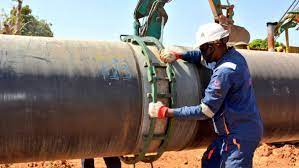By Habeeb Adamu
…final investment decision set for 2023, says NNPC
Nigeria and Morocco last week signed a memorandum of understanding on a gas pipeline project linking both countries, raising the possibility of a new energy-supply route for West Africa and Europe.

At the MoU signing ceremony in Rabat, NNPC confirmed that a final investment decision for the gas pipeline should be made in 2023.
“All the countries in the West African sub-region are focused on this and they want to deliver on this,” Mele Kyari, NNPC CEO, said.
The 5,600-km (3,840-mile) conduit along West Africa’s coast, which would be one of the longest pipelines ever built, would provide gas to the 15-country ECOWAS and permit fuel to be shipped to Spain and the rest of Europe.
It is expected to bring more than 5,000 billion cubic metres of natural gas to Morocco. From there, it will be connected directly to the Maghreb Europe Gas Pipeline (GME) and the European gas network.
Nigeria possesses Africa’s largest proven gas reserves at about 200 trillion cubic feet.
Sediko Douka, ECOWAS commissioner for infrastructure and energy, said the project could help advance energy security, regional integration and access to electricity in West Africa.
The region’s three landlocked countries, Burkina Faso, Mali and Niger, could also be linked to the offshore pipeline, while gas from Ghana, Ivory Coast, Senegal and Mauritania could be exported through the pipeline, he said.
Morocco and Nigeria announced their intention to build the pipeline in 2016 and have since then carried out feasibility studies on the project. Saudi Arabia-based Islamic Development Bank and the OPEC Fund for International Development have committed nearly $60 million to finance feasibility and engineering studies.
If the pipeline project advances, it would take many years before it delivers any gas. In 2018 when Nigeria and Morocco signed a previous agreement, both governments said the project could take 25 years to finish.
No price tag has been put on the project, though it is estimated to cost billions of dollars.
In June, after Nigeria’s Federal Executive Council (FEC) approved NNPC’s proposal to sign an agreement with ECOWAS to construct the Nigeria-Morocco gas pipeline, Timipre Sylva, minister of state for petroleum resources, informed that the project was still at the designing and engineering stage and that a precise cost would be established once the designing stage was completed.
“The council approved for the NNPC Ltd to execute MoU with ECOWAS for the construction of the Nigeria-Morocco gas pipeline. This gas pipeline takes gas to 15 West African countries and Morocco and through Morocco to Spain and Europe,” Sylva said.
The signing ceremony comes at a time when several countries, particularly in Europe, are increasingly hungry for new sources of gas and seeking to reduce their dependence on Russian supplies following Russia’s invasion of Ukraine.
The Russian invasion of Ukraine in February 2022 has compelled global leaders to push to adopt a punishment for Russia’s military activities in Ukraine, with the EU announcing a collective agreement to ban 90 percent of Russian oil imports by the end of 2022. Nigeria has been positioning to close the gap through such projects as the Nigeria-Morocco gas pipeline and a second transcontinental gas pipeline that would travel about 4,400 kilometres from Nigeria through the Sahara Desert to northern Algeria for onward transport to European markets.







